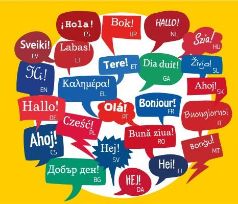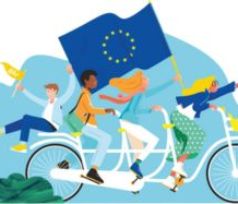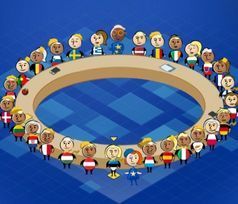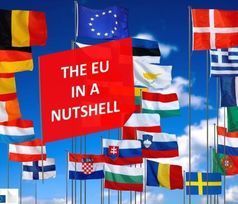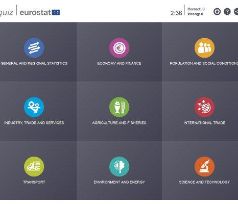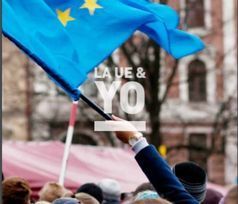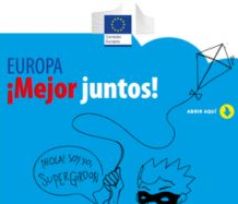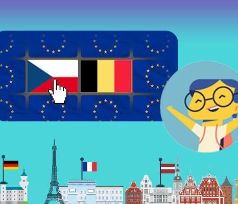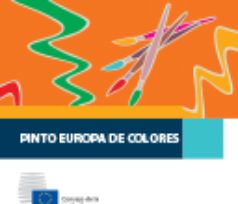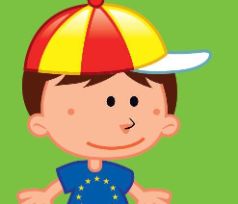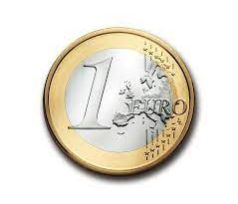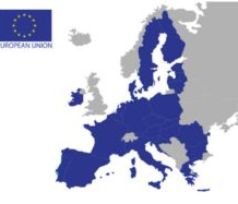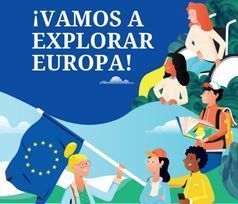- Home
- Resources
- Sites of interest
- European Union
The European Union
News
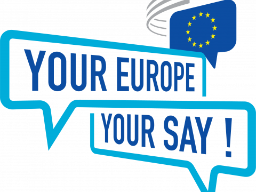
08/11/2024
News
- European Union
¡Tu Europa, tu voz! Una iniciativa de la UE para dar voz a la juventud
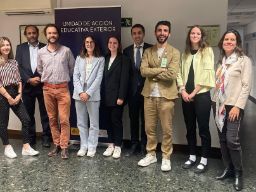
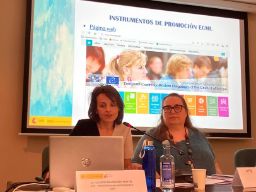
11/06/2024
News
- European Union
European Educational Resources
The European Union is a joint economic and political union among 27 European countries. Spain has been a member since 1986, a member of the Schengen area since 1995 and a member of the euro zone since 1999.
But… Who created the European Union? And why did Spain join? How does it work? Oh! And... Can we participate? In what way?
Find the answers to these questions (and many more!) in the selection of educational resources published by the European Union offered on this page.
The Council of the European Union
The Council of the European Union, composed of ministers from the 27 Member States, is one of the three key institutions of the European Union. This body, together with the European Parliament, plays a fundamental role in the legislative and decision-making process, taking as a reference the proposals of the European Commission. It is an essential entity in shaping the policies and direction of the EU, ensuring that the interests of all Member States are represented at the Community level.
- What does the Council of the European Union do?

- Not to be confused with either the European Council
 or the Council of Europe
or the Council of Europe 
- More information about the Council of the European Union

The Council Presidency
The Council of the EU is chaired, on a rotating basis, every six months by a member state, which is responsible for deciding the agenda of the meetings and promoting decision-making within the Council. There is no election for the Presidency of the Council; each state takes its turn. This means that all member states hold the Presidency of the Council at some point in time. Their turn comes every thirteen and a half years.
When it is their turn, the member states holding the presidency work closely together in groups of three, known as "trios". The trio sets the long-term objectives and draws up a common agenda with the themes and main issues to be addressed by the Council over an 18-month period. On the basis of this agenda, each of the three countries prepares its six-monthly program in greater detail.
- Detailed information on the Council's rotating Chairmanship

- What does it mean to hold the Presidency of the Council of the European Union?

Spanish Presidency (2nd semester, 2023)
Spain has held, for the fifth time in its history, the Presidency of the Council of the European Union during the second half of 2023, between July 1 and December 31. The last time it held the Presidency was in 2010.
The Trio of Presidencies in which Spain is a member is made up of Spain, Belgium and Hungary, with Spain holding the Presidency first.
Under the slogan "Europe, closer", during its Presidency, Spain's priorities have been to reindustrialize the EU and guarantee its open strategic autonomy; to advance in ecological transition and environmental adaptation; social and economic justice; and the strengthening of European unity.
In regard to education, the priorities of the Spanish Presidency have been as follows:
- the promotion of common European values and democratic citizenship
- the digitalization in education and training
- the development of the European Education Area and the EU's open strategic autonomy
Three non-legislative dossiers related to European citizenship and common values and digital skills were approved by the Council of Ministers on November 23, 2023:
- Council conclusions on the contribution of education and training to the strengthening of common European values and democratic citizenship

- Council recommendations on key enablers for the success of digital education and training

- Council recommendations on improving the provision of digital skills in education and training

Belgian Presidency (1st semester, 2024)
Following the end of Spain's turn, Belgium took over the Presidency of the Council of the European Union on January 1, 2024, and will then pass the baton to Hungary on July 1, 2024.
Under the slogan "Protect. Strengthen. Prepare", Belgium will focus on six thematic areas for its work during their Presidency:
- Uphold the rule of law, democracy and unity
- Improve our competitiveness
- Achieve an ecological and just transition
- Strengthen our social and health agenda
- Protect people and borders
- Promote a global Europe
As far as education is concerned, Belgium has set as its priorities:
- Lifelong learning
- Evidence-informed education
- Mobility
- Digital education
Work is currently underway on the development of two non-legislative dossiers related to mobility and evidence-informed education in the European Education Area.
Hungarian Presidency (2nd Semester, 2024)
After the end of Belgium's turn, Hungary took over the Presidency of the Council of the European Union on July 1, 2024, which will end on December 1, 2025, when it will pass the baton to Poland. Hungary will bring to an end the Trio Presidency in which it has participated together with Spain and Belgium. The new trio to be inaugurated by Poland will include Denmark and Cyprus.
Under the slogan “Make Europe Great Again”, MEGA, the Hungarian Presidency's program will be structured around seven priorities:
- the acceptance of a New European Competitiveness Pact;
- the strengthening of the European defense policy;
- a coherent and merit-based enlargement policy;
- the containment of illegal immigration;
- shaping the future of cohesion policy;
- a farmer-oriented EU agricultural policy;
- and the response to demographic challenges.
As far as education is concerned, Hungary has set as its priorities:
- competitive European higher education,
- adaptation to the digital and ecological transition,
- and strategic partnerships in education and training, which should be promoted through vocational training tools, higher education and adult education.
On the latter topic, the Hungarian Presidency plans to adopt Council Conclusions. The Hungarian Presidency will also be responsible for negotiating the Higher Education Package ![]() , which includes 35 recommendations focusing on a European quality assurance and recognition system, as well as on attractive and sustainable careers in higher education, and the communication on a common European degree.
, which includes 35 recommendations focusing on a European quality assurance and recognition system, as well as on attractive and sustainable careers in higher education, and the communication on a common European degree.
The Hungarian Presidency logo ![]() features the iconic Rubik's cube, a world-renowned Hungarian invention that symbolizes Hungary's support for European unity and collaboration.
features the iconic Rubik's cube, a world-renowned Hungarian invention that symbolizes Hungary's support for European unity and collaboration.
Educational Materials
This section offers a collection of teaching materials to familiarize teachers and students in schools with the European Union and the Spanish Presidency of the Council of the EU. These materials are publicly available thanks to the collaboration of the European Union.
General Resources

Clases participativas sobre la UE.
Materiales en las lenguas cooficiales. Creado por el Parlamento Europeo.
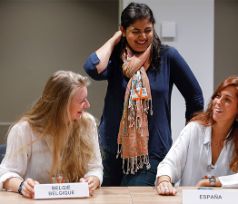
Juego de rol del Consejo de la UE.
Experiencia práctica sobre la toma de decisiones de la UE. A partir de 16 años.
Infant and Primary

Enseñanza y aprendizaje para la educación infantil y primaria
Recursos educativos, como cuentos ilustrados, cuadernos de ejercicios y libros para colorear. Europa
ESO, Baccalaureate and Vocational Training

Herramientas para centros escolares: «La democracia de la UE en acción"
Links
- Publications of the European Union

- European Union Learning Zone

- Council of the European Union: Educational Resources

- European Parliament: Learning Resources



